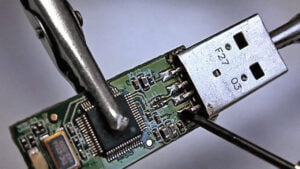
About flash drive
A USB drive is portable for users to take anywhere and fast to read, write, transfer and save data.
USB (USB Flash disk – UFD): A storage device that uses Flash memory to communicate via a USB port. Flash memory is a type of chip EEPROM (Electrically Erasable Programmable ROM) – can read / write electrically and does not lose data when disconnected from the power supply..
Multimedia Card (MMC): The MMC memory card has a size of 24 x 32 x 1.4mm. The contact board of the MMC memory card is integrated on the back of the card, so you can use the media card with the slots of the SD card because it is the same shape and design.
SD memory card (SanDisk TransFlash): This is the most common type of memory card today, often used with high-end mobile technology devices. SD memory cards are divided into several lines: SD, SDHC, miniSD, microSD, SDXC.
CompactFlash (CF) Memory Cards: CF cards have much higher read/write speeds and durability than SD cards. This type of memory card is very suitable for cameras and camcorders.
Some of the common data loss scenarios for flash drive
USB flash storage relies on a microcontroller, flash memory chips (NAND), USB interface and a crystal oscillator, all of which are prone to physical damage and logical corruption. While there are no moving parts in a flash drive, they degrade simply due to the amount of write operations. Similarly, the USB connector can wear out over time and the PCB is prone to damage. Given the size of USB parts and multi-layered circuitry, data recovery can be a challenge.

Flash drive data recovery
At HTI Services, we have a team of leading experts in Vietnam in the field of digital forensics and over 15 years of experience in data recovery on HDD and various drives. We have developed the latest generation software and hardware tools for recovering data from all types of removable media. With high expertise, advanced equipment and professional processes, security commitment, HTI Services will bring you the most reliable and optimal service.



